- Home
- Patricia Highsmith
The Cry of the Owl Page 4
The Cry of the Owl Read online
Page 4
Robert stared at her, shocked to silence. Death was the last thing he’d expected her to talk of. And her words reminded him of his own dream, his damned recurrent dream.
“What do I represent to you?” she asked.
He cleared his throat, embarrassed. “A girl with a home, a job—a fiancé. A girl who’s happy and content.”
She laughed, a slow, soft laugh. “I’ve never thought of myself as content.”
“People never do, I suppose. It’s just the way you looked to me. I was feeling low and you looked happy to me. That’s why I liked to look at you.” He did not feel he had to apologize or be ashamed of that any more. She wasn’t the kind of girl who’d assume he had been watching her undress. She seemed too innocent for that.
“What were you depressed about?” she asked.
“Oh, nothing that I can talk about.” He frowned. “None of this makes any sense unless I say that life is meaningless unless you’re living it for some other person. I was living for you since September—even though I didn’t know you.” He scowled at the table, feeling he had just delivered a minor Gettysburg Address. The girl was going to laugh, ignore it, or just say, “Um-hm.”
She sighed. “I know what you mean. I really do.”
He looked up from the table, solemn-faced. “You work at Humbert Corners?”
“Yes, in the bank there. I’m a teller and I also help out with the bookkeeping, because I was trained for it in college. I majored in sociology, but I never finished college. I suppose I’ll be one of those people who raise a family and then go back to school and finish.”
She was probably a bit lazy, he thought, very easygoing and lazy. “You’re going to be married soon?”
“Um-hm, in the spring. Greg wants it sooner, but after all, we’ve hardly known each other four months. His name is Greg Wyncoop. He sells pharmaceuticals.”
Robert felt suddenly uncomfortable. “You’re going to see him tonight?”
“No, he’s on the road tonight. He’s coming back tomorrow.” She accepted absently the cigarette he offered, took his light as if she were unused to smoking.
“You’re very much in love with him?” He wanted her to be.
“I think so,” she answered earnestly. “No wild excitement like—Well, there was a fellow in Scranton I liked better, two years ago, but he married someone else. Greg’s a marvelous fellow. He’s awfully nice. And our families like each other; that’s a help. My family didn’t approve of the fellow I liked in Scranton. Not that I’d have let that bother me, but it makes things harder.”
It sounded very dull to Robert, and regrettable. She didn’t love Greg enough, from the way she spoke. But she might be just the sort of girl to make a success of a marriage to a man she wasn’t passionate about, yet really liked. Look what had happened to him and Nickie after their enthusiastic start. He was about to push his chair back and get up when she said, “I think I’m afraid of marriage.” She was staring at the ashtray, her cheek propped on her hand with its long fingers turned under.
“I’ve heard of girls saying that before they’re married. Men, too.”
“Have you ever been married?”
“No.”
“I can’t imagine anyone easier to marry than Greg, so I suppose if I ever do it, it’s got to be him.”
“I hope you’ll be very happy.” He stood up. “I must go. Thanks—thanks for—”
“Do you like cookies?”
He watched her open the oven door, then pull some wax paper from a roll and tear it off. Each cookie had a raisin in its center. She put half a dozen or so on the wax paper.
“I know,” she said shyly, “you think I’m crackers or something. Maybe it’s the Christmas spirit. But there’s nothing wrong with giving somebody cookies, is there?”
“I think it’s very nice,” he replied, and they both laughed. He put the cookies gently into the pocket of his overcoat. “Thank you very much.” He went to the door.
“If you’d ever like to talk again—well, call me up and come over. I’d like you to meet Greg. We don’t have to tell him—that we met the way we did. He wouldn’t understand, probably. I’ll tell him—oh, for instance, you’re a friend Rita introduced me to.”
Robert shook his head. “Thanks, Miss Thierolf. I certainly don’t think Greg would understand. It’s probably just as well I don’t meet him.” He saw at once that she took it as a rejection of her, too. Well, so be it, he thought.
“I hope you call sometime,” she said simply as she went to the door. “Don’t you have a car?”
“Down the road a bit.” His shame was back, in full force. “Goodbye.”
“Goodbye.” She put on the porch light for him.
The light let him see a few yards on the driveway, and then he used his flashlight. Once on the road, he began to whistle a tune, out of nervousness, shame, madness—or all three.
Half an hour later, he was home. He lit a cigarette, and then the telephone rang. It was Nickie calling from New York.
“Well, where’ve you been?”
Robert sat down and slumped in the chair in order to sound pleasant and relaxed. “Out for a while. Sorry. You’ve been trying to get me?”
“For hours. I bring you good tidings of great joy. You’re going to be a free man in a month. And I’m marrying Ralph as soon as I possibly can.”
“That’s very nice. I’m glad things are moving. I hadn’t heard anything from the lawyer.”
“Why should you? I give him orders what to do.” Now she sounded a little high.
“Well, thanks very much for telling me.”
“The bill will be sent you in due time. Fifty-fifty, O.K.?”
“O.K., certainly.”
“How’s your mind these days? Lose it yet?”
“I don’t think so.” How he regretted ever saying anything about his “sanity” to Nickie. He’d said it carelessly once during one of their conversations about his depressions, said that depressions were such a torture they could make a person lose his sanity, or something like that, and Nickie had been sympathetic, had said he ought to go to a psychotherapist, so he had gone to one. And then, in a matter of days, she had begun to throw up his words to him, saying he admitted being insane, so naturally he was, and she was afraid to be in the same house with him, and how could anybody love or trust someone insane?
“Still burying your head in that little hole down there?” she went on, and he heard the click of her cigarette lighter as she closed it.
“It’s not a bad town at all. Not that I expect to live here the rest of my life.”
“I’m not interested in your plans.”
“O.K., Nickie.”
“Meet any interesting girls?”
“Veronica, how about sticking to Ralph and your painting and letting me alone?”
“I’ll let you alone. You can be sure of that. You’re a creep and I’m sick of creeps. And as for my painting, I did two and a half canvases today. How’s that? Ralph inspires me, you see? He’s not like you, moping around—”
“Yes, I know. I understand.”
She gave a contemptuous laugh. In the seconds she took to think of something else to say, he said:
“Thanks again, Nickie, for calling me up to tell me.”
“Good bye!” She slammed the telephone down.
Robert took off his tie, went into the bathroom, and washed his face. Why was she always so angry, he wondered, so flippant, so eager to hurt? He was sick of asking himself that, yet it was a perfectly natural thing to ask, he thought. Even Peter Campbell—or had it been Vic McBain?—had asked him the same thing when Robert had told him about one of his quarrels with Nickie. It had been a funny quarrel over the misunderstanding of a sofa-cover color, which was why he had told it. But the end of it had not been so funny, because Nickie had hung onto the incident all day and the night and the next day, a whole weekend, Robert remembered. He had told it to Peter, and now he remembered Peter’s smile fading and Peter asking, “But why
was she so angry about it?” Robert could come up with some answers for himself, such as, Nickie didn’t like him because he was often depressed, rather inarticulately melancholic, and he couldn’t blame her for that. Or Nickie was very ambitious about her painting, and a man in her life represented a threat, against her time or whatever, a threat of being dominated, perhaps (witness her choice of Ralph Jurgen to marry, a pretty weak character, Robert thought, someone Nickie could easily dominate). Or, Nickie’s ego was so weak or so sensitive, she couldn’t bear the least criticism, and toward the last she’d begun to accuse him of saying things he had not said, and when he denied them, she had told him he was losing his mind. Robert could go over these things, but they still did not explain her furious anger against him, didn’t explain it to his satisfaction. There was a missing link somewhere, and he doubted if he would ever find it, if it would ever pop into his head so that he could say, “Ah, now I understand, now it all makes sense.”
He stood looking out his window at the two-story white house across the street, with its window on the top floor full of plants. Sometimes an elderly man sat reading a newspaper in the armchair just beyond the plants, but tonight the chair was empty. He could see a child’s tricycle in the shadows on the porch. At the corner to the left, there was a drugstore-luncheonette that smelled of chocolate syrup, where Robert had bought toothpaste and razor blades a couple of times. Down at the other corner, out of sight from him, was a rather gloomy Y.M.C.A. Two or three blocks away, straight ahead, was the railroad station, where he’d picked up the box Nickie had sent him of items he had forgotten. Not that he’d forgotten most of them, since most of them had been things he’d bought for the house—an expensive clothes brush, a vase, a big glass ashtray, a ten-inch-high Mayan statue he had found in a shop in the Village. But sending them to him was another way of Nickie’s saying, “We’re finished, and take every damned thing you brought here!” Yes, she had finished with him abruptly, as abruptly as she finished with a name she had chosen to paint under. She was on her fourth or fifth name now—Amat. Or perhaps Ralph had inspired her to choose another. And when would Ralph start getting the treatment, Robert wondered. The on-again-off-again treatment, the manufactured quarrels, the rages followed by apologies. When would Ralph start to get fed up with the drunks asleep in the bathtub, on the living-room sofa, maybe in his own bed?
Robert went into his kitchenette and fixed himself a Scotch and water. It had taken him nearly six months, the whole last six months, to learn that Nickie was playing a game, playing it so well she could produce real, wet tears out of her eyes when she apologized, when she told him she loved him and that she still believed they could make a go of it together. And hope had sprung up in Robert every time, and he had said, “Of course we can. For God’s sake, we love each other!” And at Nickie’s request, he would move out of the hotel that at her request he had moved into, and then the game would repeat itself, with a manufactured quarrel: “Go back to your filthy hole of a hotel! I don’t want you in the house tonight! Go back and pick up some whore, I don’t care!” And slowly but surely Ralph Jurgen had come on the scene, and as Nickie became more sure of Ralph, her interest in the game with Robert had diminished.
He and Nickie had started out so differently, very much in love with each other, and Nickie had said many times, “I’ll love you the rest of my life. You’re the only man in the world for me,” and he had every reason to think that she meant it. Their friends told him she had said the same thing to them about him. It was Nickie’s second marriage, but those who had known her first husband—very few people, actually, only two or three, because Nickie had evidently dropped all the people she had known with Orrin Desch—said that she had never cared as much for Orrin. Robert and Nickie had planned a trip around the world in two years—now one, Robert realized. He remembered her going all the way to Brooklyn once to find a certain drawing pen that he had wanted. And maybe for a while, maybe for about a year, Nickie had loved him. Then the incidents had begun to come, minuscule incidents that Nickie could blow up into a storm. What were the letters from Marion doing at the back of the drawer in his desk at home? Marion was a girl he had been in love with four years before. Robert had forgotten he had the letters. Nickie had found them and read them all. She suspected Robert of seeing Marion—who had since married—now and then in New York, maybe for lunch, maybe when he said he was working overtime at the office. Robert had finally taken the letters into the hall of the building and thrown them down the incinerator—and later regretted it. What right had Nickie to look in his desk, anyway? Robert thought her unsureness of herself—it seemed to be that—might come from her dissatisfaction with herself as a painter. Robert had met her at the time she was beginning to realize she could not get into the uptown galleries merely by giving lavish parties for reviewers and gallery owners. Nickie had a small income from her family and with that, plus Robert’s salary, she could afford rather fancy parties. But every gallery manager, it seemed, had told her to try showing on Tenth Street and then work up, and at last Nickie had accepted the fact that she had to do this. And it was difficult enough even to show on Tenth Street. During the two years and six or seven months they had been married, Nickie had had perhaps three shows and they had been in Tenth Street group shows. Reviews were few.
Robert went to his closet and felt for the wax paper of cookies in his overcoat pocket. There they were, tangible, even edible. He smiled. There were nice people in the world after all, kind people, friendly people, maybe even married people who didn’t quarrel like mortal enemies when they quarreled. Robert blamed himself for taking his and Nickie’s breakup overly hard just because it had been theirs, his pain too hard just because it was his. One had to see things in proportion. That was what made the difference between a sane person and an unbalanced one. Remember that, he told himself.
He nibbled a cookie and thought of Christmas. Jack Nielson had invited him to spend Christmas with him and Betty, and Robert thought he would accept. He would buy a lot of toys for their little girl. It seemed better than going all the way to Chicago to see his mother and her husband, Phil, and if he went, he’d certainly have to tell them something about the breakup with Nickie, even though his mother wasn’t the kind to ask a lot of questions. Robert’s stepfather had two daughters by his first marriage, and they had children, so the house would be full on Christmas, anyway. The Nielsons’ invitation was also more attractive than the two or three he had received from friends in New York, because the people in New York were friends of Nickie’s, too.
4
“Hello,” she said. “Are you feeling better?”
“Who’s this?”
“This is Jenny Thierolf,” said the slow, smiling voice. “I just thought I’d call and say hello and see how you are. Did you have a nice Christmas?”
“Very nice, thanks. I hope you did.”
“Oh, sure. My parents and Greg’s. It was very homey.”
“Well—that’s the way Christmas should be. Were you snowbound?”
“Was I? I am now. Where are you?”
He laughed. “In a town. I suppose things are easier.”
“I’m getting plowed out tomorrow morning. Eight dollars a whack. It’s my third whack. What a winter! The only good thing is my phone wires didn’t come down, but my electricity did one night.”
Silence. He couldn’t think of anything to say. His mind dwelt for a couple of seconds on the fact he hadn’t sent her flowers at Christmas, that he’d had an impulse to and checked it. He’d sent her nothing.
“You don’t sound depressed anymore,” she said.
“Things are better.”
“I thought one night this week you might like to come for dinner. How is Wednesday for you?”
“Thank you, but—why can’t I invite you? Don’t you like to go out?”
“I love to go out.”
“There’re two good restaurants near here. Do you know the Jasserine Chains at Cromwell?”
“The
Jasserine Chains?”
“It’s the name of an inn. With a restaurant. I’ve heard it’s very good. Shall we meet there?”
“All right.”
“At seven?”
“Seven’s fine,” she said.
Her call put him in a good mood for several minutes, until a thought came to him: She would come with Greg, and Greg would report him to the police. Then the idea vanished. The girl simply wasn’t that type, wasn’t that calculating, he felt sure. It pleased Robert that without forethought he had proposed she meet him at the restaurant rather than for him to call for her. It made their appointment a little more casual.
On Wednesday evening, sleet fell upon a ten-day-old snow, and made the roads icy and dangerous. Robert expected the girl to be late, perhaps to call him and say that she couldn’t make it at all, but she did not call, and she came into the Jasserine Chains punctually at seven. Robert was waiting in the lobby, which had a mahogany staircase, carpets and mirrors and paintings, like the hall of a private house. She was wearing stadium boots, her high-heeled pumps in her hand, and she effected the change, holding on to his arm, in front of the wardrobe check booth.
“These things are so aw-wful,” she said apologetically.
They were shown to a table a pleasant distance from the fireplace. When he proposed a cocktail, she said she would have a Manhattan. She wore a blue-and-black patterned dress that looked to Robert a bit old and sedate for her. Her earrings were half spheres of silver. Their conversation, for the first fifteen minutes, was platitudinous. (“Oh, if any car can move in the slush, it’s a Volkswagen,” Jenny said.) Robert was uncomfortably conscious of the aroma of his hair: he had just had a haircut, and the barber had doused him with tonic before Robert could stop him. The girl’s eyes dwelt on him, stared at him, but what she was thinking about him Robert could not tell, and her conversation gave no clue. She talked casually of her family in Scranton, of her old-fashioned father, who hadn’t wanted her to go to college and who had insisted that she take some business courses as well as sociology. She asked him about his schools. He had gone to the University of Colorado. He hadn’t finished until he was twenty-four, because of money problems, he told her, though actually he hadn’t finished sooner because of a depression that had hit him at nineteen, a year after his mother remarried. Robert considered it the low point in his life, a period he was vaguely ashamed of. He had fallen apart because it had seemed to him that his family had fallen apart, though he had really approved of his mother’s marrying again and he liked the man she had married. Robert’s father had drunk too much, had never known how to manage his money, and nothing but his mother’s patience had held the family together—only three of them, as he had no brothers or sisters—until his father killed himself in a car accident when Robert was seventeen. But Robert did not tell any of this to Jenny.

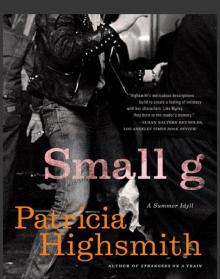 Small G: A Summer Idyll
Small G: A Summer Idyll The Boy Who Followed Ripley
The Boy Who Followed Ripley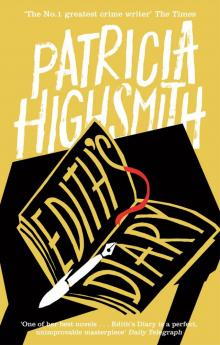 Edith's Diary
Edith's Diary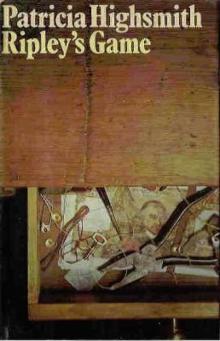 Ripley's Game
Ripley's Game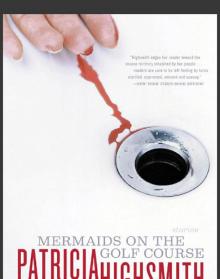 Mermaids on the Golf Course: Stories
Mermaids on the Golf Course: Stories Slowly, Slowly in the Wind
Slowly, Slowly in the Wind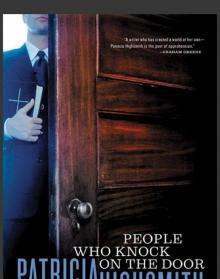 People Who Knock on the Door
People Who Knock on the Door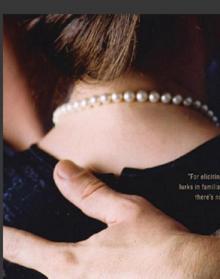 The Glass Cell
The Glass Cell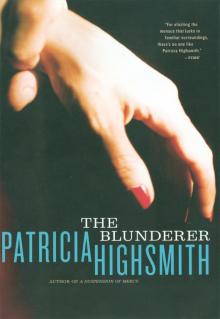 The Blunderer
The Blunderer Those Who Walk Away
Those Who Walk Away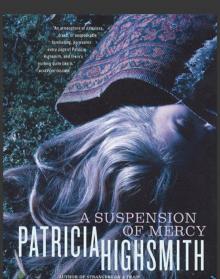 A Suspension of Mercy
A Suspension of Mercy Eleven
Eleven Found in the Street
Found in the Street Ripley Under Ground
Ripley Under Ground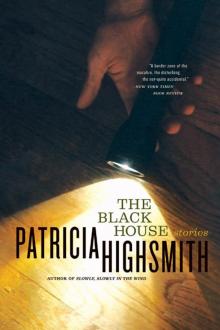 The Black House
The Black House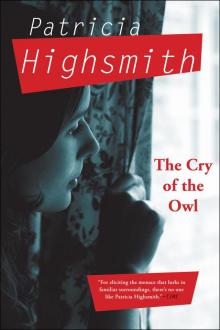 The Cry of the Owl
The Cry of the Owl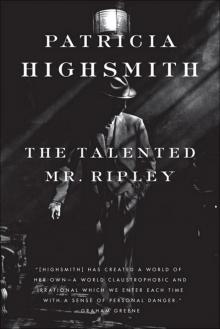 The Talented Mr. Ripley
The Talented Mr. Ripley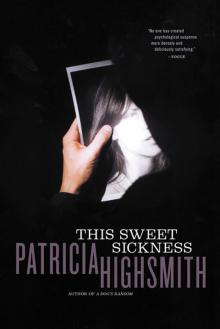 This Sweet Sickness
This Sweet Sickness The Two Faces of January
The Two Faces of January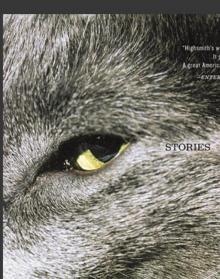 The Animal-Lover's Book of Beastly Murder
The Animal-Lover's Book of Beastly Murder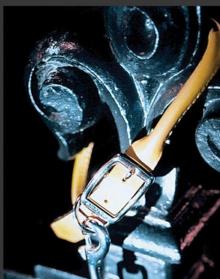 A Dog's Ransom
A Dog's Ransom Deep Water
Deep Water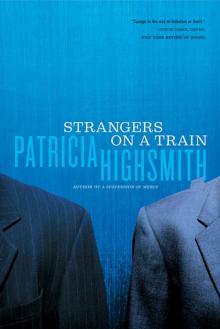 Strangers on a Train
Strangers on a Train Ripley Under Water
Ripley Under Water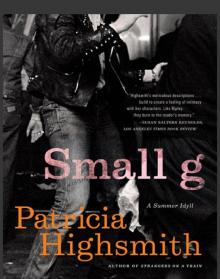 Small g
Small g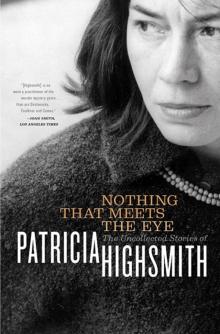 Nothing That Meets the Eye
Nothing That Meets the Eye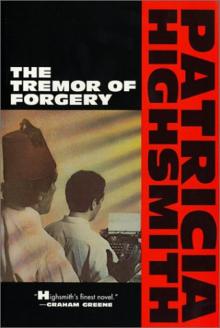 Patricia Highsmith - The Tremor of Forgery
Patricia Highsmith - The Tremor of Forgery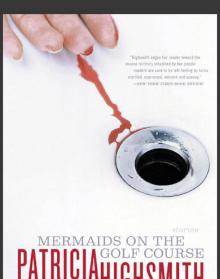 Mermaids on the Golf Course
Mermaids on the Golf Course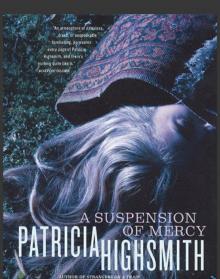 Suspension of Mercy
Suspension of Mercy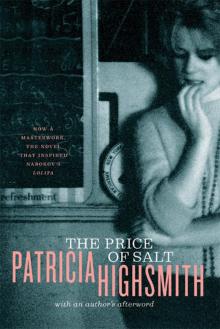 The Price of Salt, or Carol
The Price of Salt, or Carol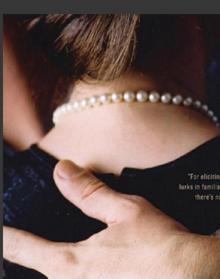 Glass Cell
Glass Cell